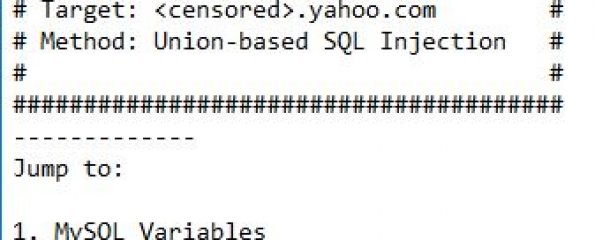Nouveau vol pour Yahoo! 1 milliard de données hackées
Le géant de l’Internet Yahoo! a confirmé ce mercredi 14 décembre, une révélation de zataz, sur le vol de 1 milliard de comptes utilisateurs au mois d’août 2013.
Souvenez-vous, en août 2016 je vous indiquait que Yahoo! devait confirmer le piratage et le vol de plusieurs centaines de millions de données utilisateurs volés via plusieurs piratages informatiques. Septembre 2016, l’ancien géant de l’Internet se voyait contraint de le faire. Sa vente à Verizon obligé l’entreprise à communiquer sur le sujet. On apprenait alors que 500 millions de données d’utilisateurs avaient été ponctionnés dans un piratage datant de 2014. Je vous expliquais alors que Yahoo! était un vrai gruyère depuis au moins 2010 avec le vol de millions d’informations : numéros de téléphone, mots de passe (Md5), adresses mails. Je vous expliquais aussi certaines failles, comme celle qui permettait de changer le mot de passe de n’importe quel utilisateur en quelques clics de souris.
14 décembre 2016, on prend les même et on rajoute une louche. Yahoo! vient de confirmer le piratage d’au moins 1 milliard de données clients dans une opération malveillante datant du mois d’août 2013. « Yahoo! croit qu’un tiers non autorisé, en août 2013, a volé des données associées à plus d’un milliard de comptes d’utilisateurs », a déclaré Bob Lord, l’officier en chef de la sécurité informatique de Yahoo!. « La société n’a pas été en mesure d’identifier l’intrusion associée à ce vol. Yahoo! croit que cet incident est probablement distinct de l’incident de la société révélé le 22 Septembre 2016. » Bref, si vous recevez une notification de Yahoo!, c’est que vous êtes dans le lot et qu’il est trop tard pour vous ! Trois ans pour retrouver des logs, trois ans pour alerter des victimes, c’est un peu tard !
Étonnant de se dire que les outils d’espionnage mis en place par Yahoo!, à la demande des renseignements US pour sniffer les courriels entrants, soient plus efficace qu’un script qui alerte lors de la ponction d’information par un tiers non autorisé. En attendant, et comme je vous le disais, nous sommes bien dans le vol de plusieurs milliards de données. A suivre !
Le communiqué de presse de Yahoo!
SUNNYVALE, Calif.–(BUSINESS WIRE)–Yahoo! Inc. (NASDAQ:YHOO) has identified data security issues concerning certain Yahoo user accounts. Yahoo has taken steps to secure user accounts and is working closely with law enforcement.
As Yahoo previously disclosed in November, law enforcement provided the company with data files that a third party claimed was Yahoo user data. The company analyzed this data with the assistance of outside forensic experts and found that it appears to be Yahoo user data. Based on further analysis of this data by the forensic experts, Yahoo believes an unauthorized third party, in August 2013, stole data associated with more than one billion user accounts. The company has not been able to identify the intrusion associated with this theft. Yahoo believes this incident is likely distinct from the incident the company disclosed on September 22, 2016.
For potentially affected accounts, the stolen user account information may have included names, email addresses, telephone numbers, dates of birth, hashed passwords (using MD5 92829) and, in some cases, encrypted or unencrypted security questions and answers. The investigation indicates that the stolen information did not include passwords in clear text, payment card data, or bank account information. Payment card data and bank account information are not stored in the system the company believes was affected.
Yahoo is notifying potentially affected users and has taken steps to secure their accounts, including requiring users to change their passwords. Yahoo has also invalidated unencrypted security questions and answers so that they cannot be used to access an account.
Separately, Yahoo previously disclosed that its outside forensic experts were investigating the creation of forged cookies that could allow an intruder to access users’ accounts without a password. Based on the ongoing investigation, the company believes an unauthorized third party accessed the company’s proprietary code to learn how to forge cookies. The outside forensic experts have identified user accounts for which they believe forged cookies were taken or used. Yahoo is notifying the affected account holders, and has invalidated the forged cookies. The company has connected some of this activity to the same state-sponsored actor believed to be responsible for the data theft the company disclosed on September 22, 2016.
Yahoo encourages users to review all of their online accounts for suspicious activity and to change their passwords and security questions and answers for any other accounts on which they use the same or similar information used for their Yahoo account. The company further recommends that users avoid clicking links or downloading attachments from suspicious emails and that they be cautious of unsolicited communications that ask for personal information. Additionally, Yahoo recommends using Yahoo Account Key, a simple authentication tool that eliminates the need to use a password on Yahoo altogether.
Additional information is available on the Yahoo Account Security Issues FAQs page: https://yahoo.com/security-update.
About Yahoo
Yahoo is a guide to digital information discovery, focused on informing, connecting, and entertaining through its search, communications, and digital content products. By creating highly personalized experiences, Yahoo helps users discover the information that matters most to them around the world — on mobile or desktop. Yahoo connects advertisers with target audiences through a streamlined advertising technology stack that combines the power of Yahoo’s data, content, and technology. Yahoo is headquartered in Sunnyvale, California, and has offices located throughout the Americas, Asia Pacific (APAC) and the Europe, Middle East and Africa (EMEA) regions. For more information, visit the pressroom (pressroom.yahoo.net) or the Company’s blog (yahoo.tumblr.com).
Statements in this press release regarding the findings of Yahoo’s ongoing investigations involve potential risks and uncertainties. The final conclusions of the investigations may differ from the findings to date due to various factors including, but not limited to, the discovery of new or additional information and other developments that may arise during the course of the investigation. More information about potential risks and uncertainties of security breaches that could affect the Company’s business and financial results is included under the caption “Risk Factors” in the Company’s Quarterly Report on Form 10-Q for the quarter ended September 30, 2016, which is on file with the SEC and available on the SEC’s website at www.sec.gov.



































